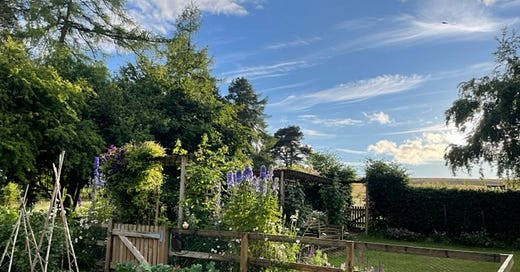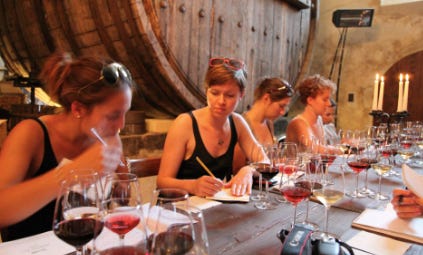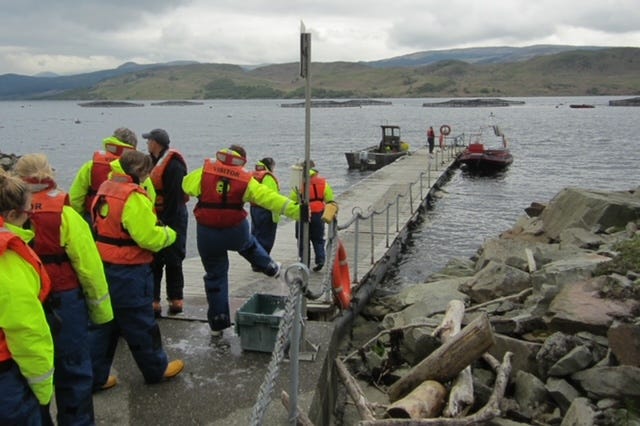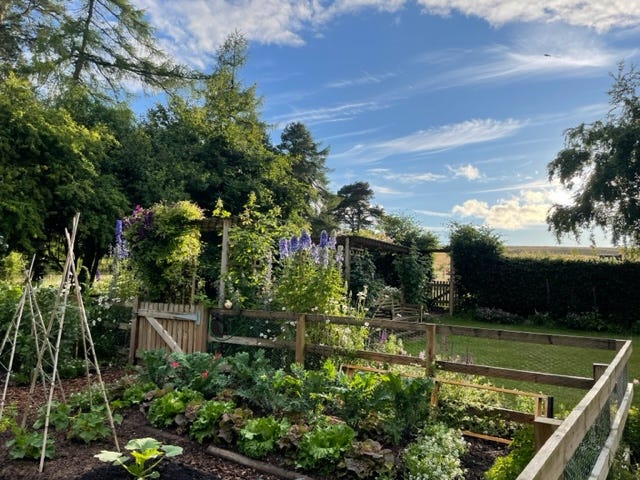I feel a tingle of envious pride in seeing how often my face appears in our family albums smeared in food. I knew what was important then and happily allowed my stomach to lead me around the world well into adulthood.
I never questioned the sense of purpose that eating gave me until I was in my twenties and living in America, where I began to worry about the origins of what I was eating. Having grown up in the Scottish Borders, farming was as familiar as the sight of rain clouds. But in America I read a bit of Pollan and realised how little I really knew about the details of food production. I began to understand the food system as something broken, and threw myself into exploring how it could be fixed. I worked with urban growers and a farmland trust and felt sure that smale scale organic farming was the key.
My horizons were about to be broadened again, when curiosity took me around the world to the University of Gastronomic Sciences in northern Italy. It was a gruelling year of consuming more cheese, wine and lardo than is humanly possible, but I survived and obtained a Masters in Human Ecology and Sustainability.
Without any idea as to how I was going to apply this degree, I focussed on what I did know: firstly, after almost a decade living abroad, I wanted to return to Scotland and do some good with what I’d learned. Secondly, I knew that love of food was at the heart of real change.
Halfway through a welcome-home cheese board and some Chianti, an old friend asked me whether studying food had changed my ability to enjoy it. No, I answered, of course not.
But of course it did. Eating remained the focus of my days, but each bite became laden with the implications of its origin and I began to separate ingredients into ethical/non-ethical, good/bad - weighty judgements that play havoc with the digestion.
And then I landed myself with an opportunity; to write and teach the UK’s first interdisciplinary food studies programme at a university just outside of Edinburgh.
We called it the MSc Gastronomy, signing ourselves up for many years of having to politely explain that this had nothing to do with stars or gastroenterology.
The purpose of the programme was to help those already working in the food industry, education and journalism, to understand the connections between seemingly disparate parts of the food system. We felt that if everyone had a more holistic understanding of food and could perceive the links between, say, farming and nutrition, or food culture and policy change, then this might cure some of the ills created in the name of feeding the planet.
After five years working on the programme, my own dichotomous perception of food had changed completely. I had seen it all. I’d set foot on tiny crofts and salmon farming cages, toured artisanal cheese producers and major abattoirs. I’d discussed policy with government ministers and been on the Food Programme. I could speak clearly and confidently about how, above all, food was complex.
But the buzzing, unwieldy complexity of it all was beginning to give me a headache. Increasingly, I found myself monitoring the progress of a seed sown back when I’d first reached America, a seed handed to me in childhood when I lived in a tiny cottage with my artist parents. My mother had created the kind of garden you could get lost in, growing vegetables and flowers across a terraced landscape above a rumbling river. She painted and entertained people in the garden and seemed full of purpose. As each successive city I called home made me more claustrophobic, the memories of that garden had grown. And now, an idea entirely unavailable to my younger self was insisting I give it a go.
Permission really came one night after whisky had been imbibed. A wise person listened to my exasperation at the state of the world, that it was all too complex and too fucked to be able to fix. Yes, he said. It is. But really, all you need to do is make beautiful the ground where you stand.1
His words flooded my heart, and I knew that was exactly what I had to do.
I would return to the countryside of the Scottish Borders where I grew up. I would find some land, I would grow my own food, and I would focus on making beautiful my own patch of ground. The simplicity of it glowed.
And as it sometimes does when an intention comes from the heart, the universe responded with impressive efficiency. Within three years I had fallen in love with a musician and found a cottage with an acre. Covid hit and we hunkered down with our new puppy. I grew our food, we ate simply and well, and I felt those words of advice reverberate throughout our new home.
Gradually, the world began to return to normal and my husband Jim was lucky enough to be able to restore his career, returning to life on the road. While he and the rest of the world took off, I got stuck in; growing, tending, working on our patch of ground.
But rather than feel a sense of fulfilment, I felt guilty and then resentful. What was I doing here, working on our home and garden, when there were more pressing needs in the world? And as time passed, our patch of land began to feel more remote, windswept and resistant to my attempts to make it beautiful.
I felt defeated, even burdened by a task that was meant to give me purpose. But those words still held my attention.
All you need to do is make beautiful the ground where you stand.
It seemed to imply a single, simple task. But perhaps there was nothing simple about it.
A meal is not made nourishing and delicious solely by the ingredients on the plate. It requires understanding and love in the preparation, a willing eater with a good appetite, and, ideally, good company and enjoyable surroundings in which to eat it.
In short, it requires relationship.
I tried considering the ground where I stood, not solely in terms of our little acre, but as the place in which I am rooted as a person. Every plant gives as much back to the soil as it takes, making a reciprocal relationship between earth and plant in which both of them can be made beautiful. The meal is not beautiful or nourishing unless it is eaten and enjoyed.
And so, food continues to be my guide as I explore what a reciprocal relationship means for me on this ground where stand.
I’ve tried to find the origin of this quote, as I remember him saying it come from the wisdom of a major world religion. But while the sentiment is found in Buddhism, Taoism and several other philosophies, I can’t attribute the quote directly.







